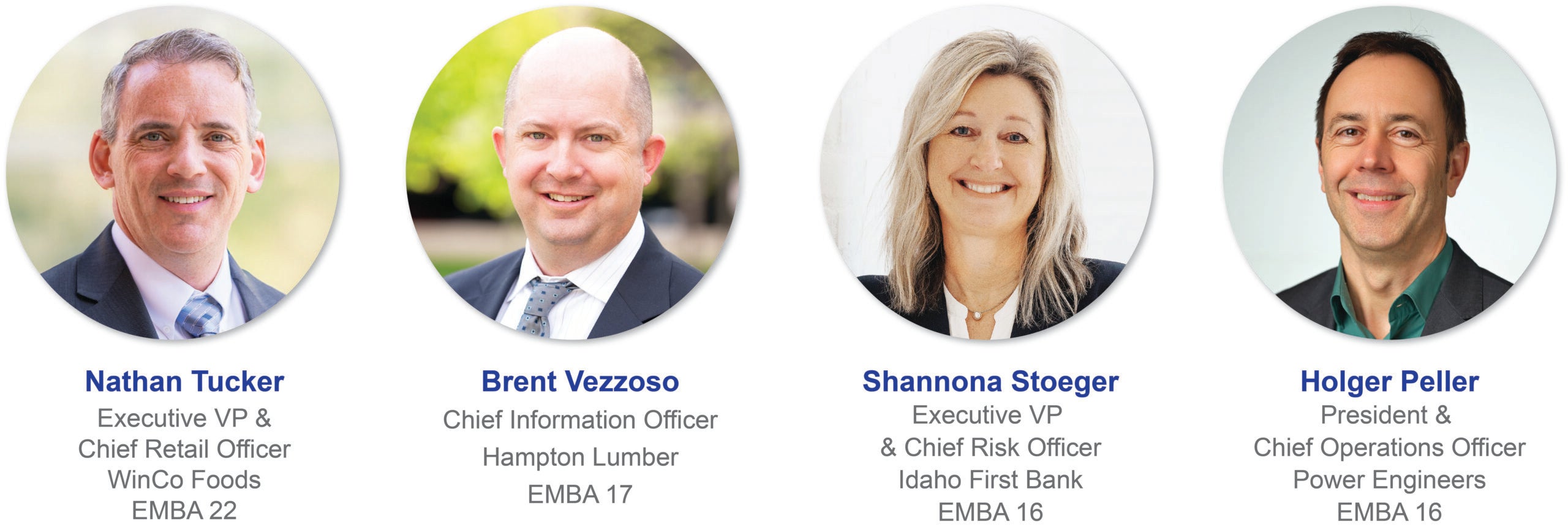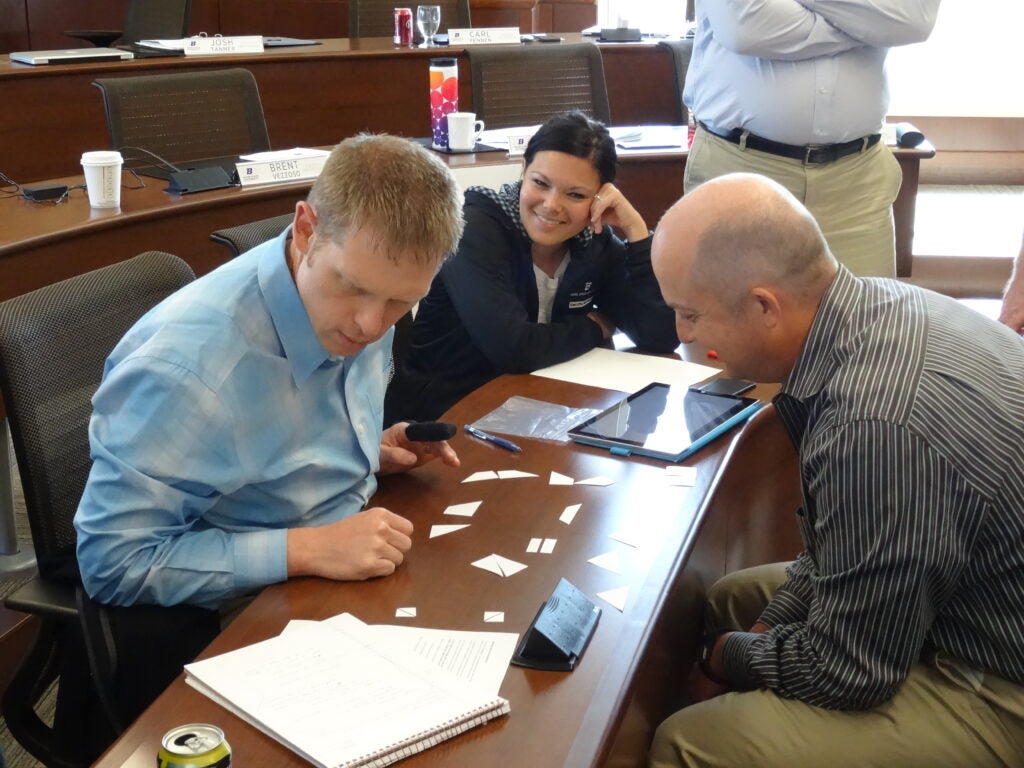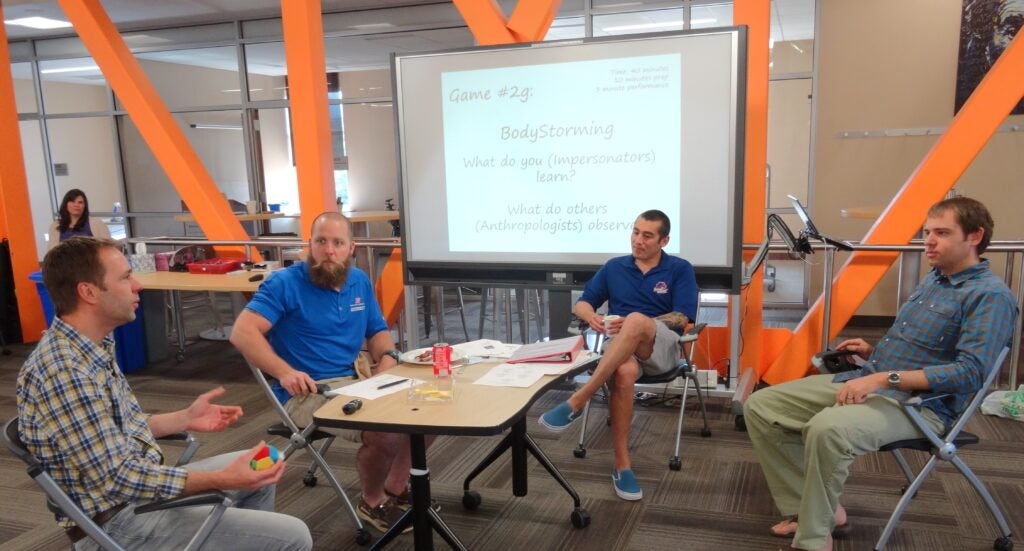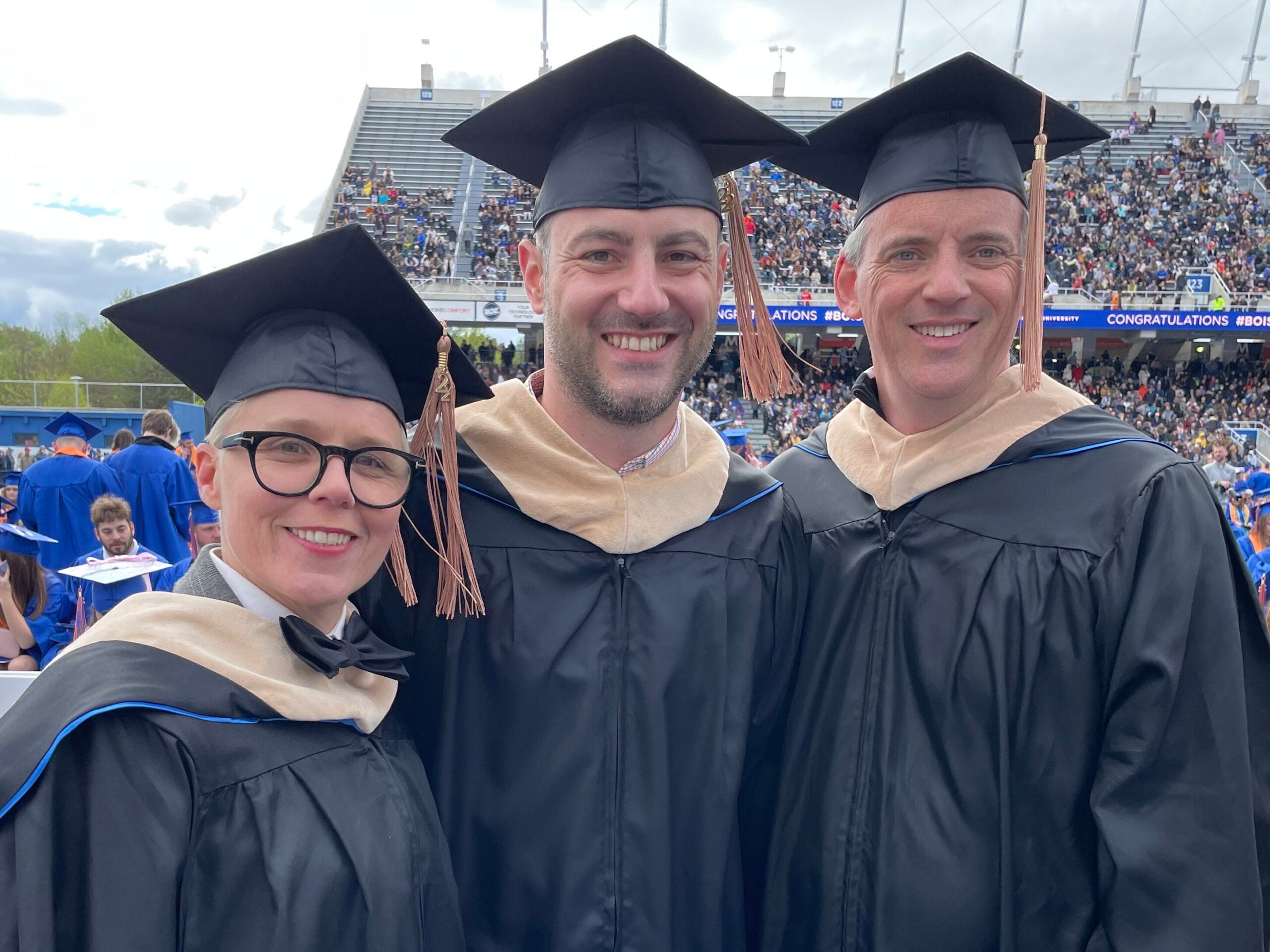In today’s fast-paced business landscape, top executives must do more than lead—they must continuously evolve. Four C-suite leaders share why they chose Boise State’s Executive MBA (EMBA) program and how it elevated their careers.
Meet the Executives

- Nathan Tucker, EVP & Chief Retail Officer, WinCo Foods, EMBA 22
- Brent Vezzoso, Chief Information Officer, Hampton Lumber, EMBA 17
- Holger Peller, President & Chief Operations Officer, Power Engineers, EMBA 16
- Shannon Stoeger, EVP & Chief Risk Officer, Idaho First Bank, EMBA 16
Why an EMBA for C-suite leaders?
Reasons for choosing an MBA are multi-faceted, but general themes are common:
- Collaboration & Perspective – Stoeger, a Boise State alum, returned for her EMBA to sharpen strategic thinking and learn alongside seasoned professionals. She found lifelong friendships and new perspectives.
- Networking and Balance – Tucker sought a rigorous program that would grow his leadership skills while connecting him to Boise’s business community. The EMBA offered the perfect blend of quality, flexibility, and professional networking.
- Diverse Cohort, Rich Learning – Each cohort includes leaders from various industries, enriching discussion and strategic insight while expanding professional networks.
- Innovative Curriculum – Vezzoso was drawn to the EMBA’s integrated approach—real-world business topics taught through cross-functional lenses. This unique, custom design is tailored for executives.
My cohort became like family. Years later, those connections still matter.
– Brent Vezzoso

From the Classroom to the Corner Office
Each executive’s rise to the top was unique—but all credit the EMBA for accelerating their success.
Holger Peller (Power Engineers) transitioned from engineering leadership to COO, directly applying EMBA lessons in finance, M&A, and communication along the way.
After graduating, I became a senior project manager, and within 18 months, I was named EVP of Power Delivery—overseeing 1,750 employees and contributing to the strategic direction of the company. Today, as President and COO, I draw on EMBA constantly—from financial acumen and M&A strategy to presentation skills and the soft skills essential for leading a large organization.
– Holger Peller
Nathan Tucker (WinCo Foods) stepped into an EVP role during the program and later became Chief Retail Officer, frequently drawing from course content for real-time decision-making.
I was in transition during the program, which turned out to be perfect timing. I can’t count how many times I returned from a weekend at BSU and found the topics we’d just covered were directly relevant to the decisions I was making at work. Not long after graduating, I was named EVP and Chief Retail Officer—and I truly believe the EMBA experience was key to making that transition successful.
– Nathan Tucker
Brent Vezzoso (Hampton Lumber) moved from tech-focused roles to the C-suite by transforming how he communicated business value.
For the first 20 years of my career, I was in deeply technical roles. While I loved the work, I felt boxed in and overlooked for the business value my teams were creating. I pursued the EMBA to shift that perception and grow into a more strategic leader. After graduating, I was able to clearly articulate business outcomes, not just technical solutions—and thanks to connections from the program, I landed my first CIO role before I even finished the degree.
– Brent Vezzoso
Shannon Stoeger (Idaho First Bank) climbed the ladder across banks, expanding her responsibilities as she applied strategic insights from the EMBA. Today, she leads enterprise-wide risk management.
The EMBA gave me the confidence and perspective to grow into each new challenge.
— Shannon Stoeger

What was the Return on Investment (ROI)?
Personal and Professional Growth
Tucker found the program’s leadership coaching to be a very valuable aspect of the Executive MBA. Tucker’s coach helped him to leverage his strengths and weaknesses to become a more well-rounded and agile leader.
I was able to see myself and my leadership style more clearly and intentionally.
– Nathan tucker
Enduring Relationships
Vezzoso believes the greatest ROI for his career were the connections made with fellow students, alums, and guest speakers. He specifically cites the EMBA Leadership Unplugged series, a monthly event where leaders from a wide variety of industries and organizations are invited to the classroom. In these sessions, participants engage in candid and intimate conversations with leaders who openly share their failures, insights gained, and proudest achievements.
I made connections with business leaders as part of the leadership unplugged series that have not only lasted but had a significant impact on the direction and trajectory of my career.
– Brent Vezzoso
Immediate Application
The EMBA curriculum combines traditional business subjects (finance, marketing, economics, etc.) into real-world business topics such as Assessing Business Opportunities, or Creating Competitive Advantage, rather than teaching semester-long courses in each siloed business discipline. Executives cite this integrated curriculum as immediately applicable and a key component of their professional success. Tucker characterizes the value as “an almost immediate ROI.”
Topics we discussed on the weekend were directly relevant to decisions I faced on Monday.
– Nathan Tucker

How do C-suite leaders balance a busy work schedule while earning an MBA?
It starts with the right design- and choosing a program with a condensed monthly format (3-4 days once per month) and concierge-level support helped these busy leaders juggle work, school, and life.
From there, these leaders advocate for open, transparent conversations and good structure:
Finding a balance started by having open and honest conversations with both my family and employer prior to starting the program. Balancing any responsibilities with work requires organization, communication and constantly juggling priorities.
– Brent Vezzoso
Structure was essential. Planning assignments helped me stay present in other parts of my life.
– Shannon Stoeger
I did a lot of reading on airplanes and a lot less Netflix. Every minute was worth it.
– Nathan Tucker
Advice for future C-suite MBAs
The best leaders know to lean on others for guidance and support – here’s what they have to say for other high-level leaders considering EMBA:
Work with your family to figure out how you can make it work and still participate in life – but plan on it being reduced involvement. On weekends, one day would be for school the other day for family. I thought the University did a great job of coaching us on the requirements of the program… the estimate of spending 20 hours per week on school work was spot on.
– Holger Peller
The value you will get out of the program will be equal to the effort you put in!
– Brent Vezzoso
Take advantage of this unique, collaborative learning environment. It will deepen your understanding but also provide invaluable networking opportunities and lifelong friendships.
– Shannon Stoeger
Don’t lose the habits picked up during EMBA – keep reading, keep studying, keep learning, keep networking – the world keeps moving and if we want to be successful, we have to be engaged in the world around us.
– Nathan Tucker

Boise State’s Executive MBA is more than a degree—it’s a transformation. With a flexible format, powerful network, and integrated curriculum, it empowers even the most seasoned leaders to level up.
Learn more about Boise State’s Executive MBA Program or complete our Let Us Tell You More online form!